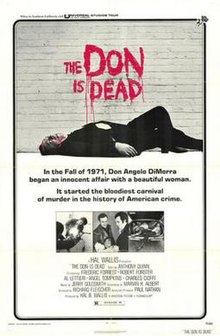| The Don Is Dead | |
|---|---|
 | |
| Directed by | Richard Fleischer |
| Written by | Christopher Trumbo[1] Marvin H. Albert Michael Butler |
| Based on | The Don is Dead by Marvin H. Albert |
| Produced by | Paul Nathan Hal B. Wallis |
| Starring | Anthony Quinn Frederic Forrest Robert Forster Al Lettieri Angel Tompkins Charles Cioffi |
| Cinematography | Richard H. Kline |
| Edited by | Edward A. Biery |
| Music by | Jerry Goldsmith |
| Distributed by | Universal Pictures |
Release date |
|
Running time | 115 min. |
| Country | United States |
| Language | English |
The Don Is Dead is a 1973 American crime film directed by Richard Fleischer and written by Christopher Trumbo, Michael Butler, and Marvin H. Albert, adapted from Albert's novel of the same name. It stars Anthony Quinn, Frederic Forrest, Robert Forster, Al Lettieri, and Angel Tompkins.
It was released by Universal Pictures on November 14, 1973, and received mixed reviews.
Plot
[edit]Frank is the ambitious son of an organized-crime boss. He plans a heroin deal with the help of Tony Fargo and his brother Vince. But when a gangland snitch secretly tips off the cops, Frank's drug deal results in a violent gun battle. In the end, Frank and the Fargos survive. Later, on discovering who set them up, Frank learns of the death of his powerful father, caused by a stroke. A meeting is thus called among the various mob families to select a new don. There, it is decided that Frank, still too young to take over for his dead father, will instead learn the business under the wing of his dad's lifelong friend, Don Angelo. In doing so, Angelo becomes a sort of Lord Protector to the future mob boss, Frank.
Unfortunately, Don Angelo begins an illicit romance with Frank's young and beautiful fiancée, named Ruby. This sends the hot-tempered Frank into a self-destructive rage. He beats up Ruby so badly she has to be hospitalized. She informs Don Angelo, who swears vengeance against Frank. Miraculously, Frank survives the attempt on his life. But the incident causes everyone to choose sides, and a bloody, all-out war is waged in the streets.
Cast
[edit]- Anthony Quinn as Don Angelo DiMorra
- Frederic Forrest as Tony Fargo
- Robert Forster as Frank Regalbuto
- Al Lettieri as Vince Fargo
- Angel Tompkins as Ruby Dunne
- Charles Cioffi as Luigi Orlando
- Barry Russo as Don Aggimio Bernardo
- Louis Zorich as Mitch DiMorra
- Ina Balin as Nella
- Joe Santos as Joe Lucci
- Frank DeKova as Giunta
- Abe Vigoda as Don Talusso
- Victor Argo as Augie the Horse
- Val Bisoglio as Pete Lazatti
- Robert Carricart as Mike Spada
- Sid Haig as The Arab
- Vic Tayback as Ralph Negri
Reception
[edit]A.H. Weiler of The New York Times was positive: "Expertise, if not imagination, is evident in the explosive, action-oriented direction of Richard Fleischer... The Don Is Dead has the attributes of some lively, pithily accented performances that are adult and effectively natural. Among these are Forrest, as the brainly hood who attempts to escape the racket, but winds up a don, Al Lettieri, as his roughhewn, dependent, ill-fated brother, and Forster, as the rising, vengeful muscleman who is eventually cut down. As the embattled don who is finally felled by a stroke, not a gun, Quinn is moodily menacing and as polished and relaxed as a professional long familiar with this sort of role."[2]
References
[edit]- ^ McLellan, Dennis (2011-01-12). "Christopher Trumbo dies at 70; screen and TV writer whose father was blacklisted". Los Angeles Times. Retrieved 2011-01-26.
- ^ "Movie Reviews". The New York Times. 2023-01-26. ISSN 0362-4331. Retrieved 2023-01-31.